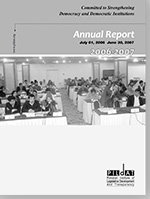The PILDAT Annual Report 2006-2007 is significant this year as it showcases the fifth year of PILDAT’s work and its achievements. PILDAT was established by a dedicated core team back in 2001 and it is a moment of great pride for PILDAT team that this indigenous organisation has completed five years of its modest contribution to the field of democracy and strengthening of democratic institutions.
The PILDAT Annual Report 2006-2007 covers the period from July 01, 2006 to June 30, 2007. During this year, PILDAT focussed on policy review and highlighting key issues facing the country through expert dialogue and discussion in the public domain. PILDAT’s focus on conflict resolution and promoting better understanding on civil-military relations led to the Dialogue Group on Civil-Military Relations writing a letter to the President and heads of political parties to address the growing polarisation through reconciliation and restraint. The Group also covered major ground by discussing and articulating in the public domain policy alternatives on issues of national concern such as the Balochistan problem, insurgency in FATA and the Judicial Crisis from the standpoint of improving civil-military relations.
With the country expected to face a General Election in late 2007/early 2008, PILDAT directed its efforts towards facilitating a group of eminent Pakistanis to monitor the process leading up to the General Election scheduled for late 2007/early 2008. The Group, formally known as the Citizens Group on Electoral Process CGEP, was formed in December 2006 and brought together a mix of well-reputed former members of the judiciary, lawyers, academicians, media persons and members of civil society. While traditionally Pakistan welcomes international election observation teams, these observer missions arrive in Pakistan near the day of election and their reports comment on the electoral processes that have already taken place. Under the objective country conditions, PILDAT considered it crucial to monitor the process leading to the election, as early as a year before the expected polls, in order to inform and educate public opinion in case of any anomalies in the electoral process. With its focus on Elections, PILDAT also organised a National Conference on Elections that brought together key experts to share their assessment of the electoral exercise and its results, especially focussing on the role of Balochistan and the NWFP.
Owing to the under-represented role of youth in country’s political and policy spheres and lack of avenues of political grooming of youth in their educational spheres, PILDAT launched the project of the first-ever Youth Parliament of Pakistan. The Youth Parliament was designed to have country-wide representation of Youth divided among the areas on the basis of population criteria used by the National Assembly of Pakistan and members were selected based on a multi-tiered selection process across Pakistan. The Youth Parliament enabled 60 young men and women, aged between 18 and 29, to face the pressure of adversarial politics and discuss issues of concern to young people in Pakistan. The experience, spanning over a year, provided the “Youth MPs or MYPs” a chance to experience life in the parliamentary spotlight and at the same time showed them how the next generation would approach parliamentary politics in Pakistan.
In addition to its objective of strengthening ties between Parliament and the people, PILDAT also partnered with international organisations to focus on the country’s judicial system and its complementarity with international legal systems.








